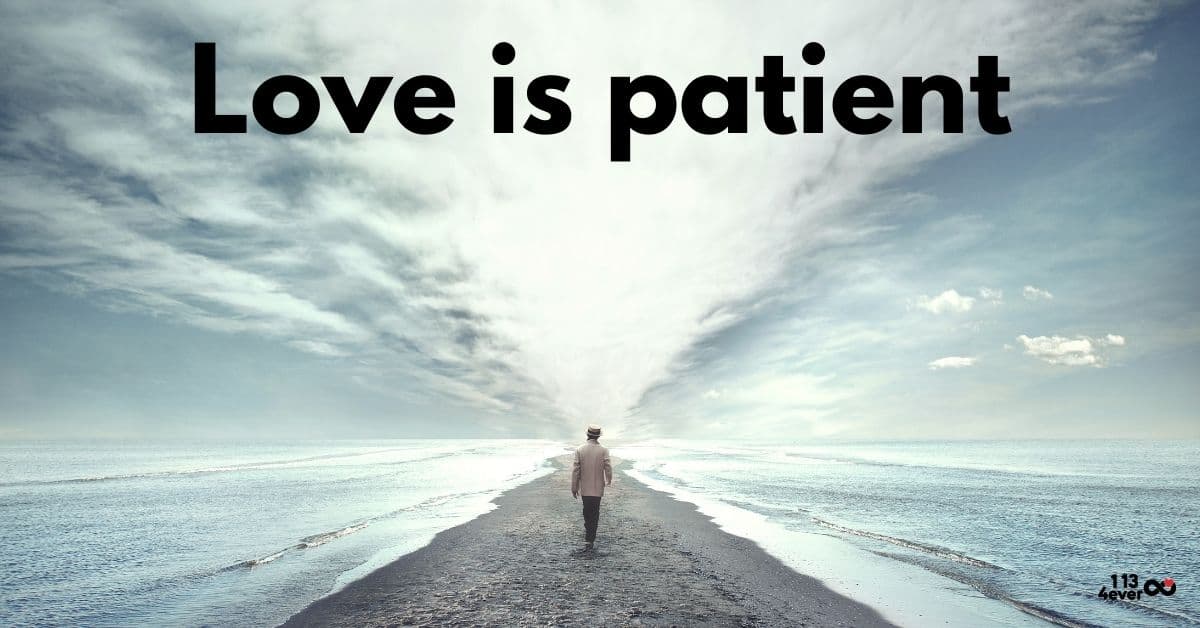Love is Patient
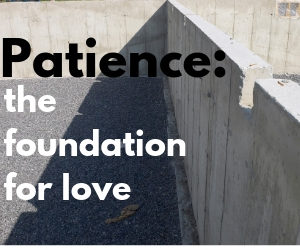
“Love is patient” starts verse 4 of 1 Corinthians 13. These 3 words begin the cascade of virtues about love in this famous Bible chapter. These words are the foundation for this amazing chapter. Without patience, love struggles. Patience brings strength. Strength brings growth.
Practice Patience Power: Benefits for Your Life and Relationships
People have probably told you to, “Be patient!” at some point throughout your entire life. You may have even heard the old saying, “Patience is a virtue.” In today’s busy world where rushing from one responsibility to the next seems a part of everyone’s life, the practice of patience gets lost in the shuffle. Despite personal or societal drive to do more faster, the power of patience provides more benefits than you may realize. Not only can practicing patience help you advance more confidently and comfortably, but it also provides innumerable benefits for all of your relationships.
How does patience affect your life?
A lack of patience has a very distinct effect on someone’s life. Imagine the last time you were stuck behind a slow car on a road and could not pass. Did you get tense, worried, and angry? How did those feelings and physical reactions affect the rest of your day? Did you go home and complain to your significant other or feel moody and stressed the rest of the evening?
These responses are very common in annoying situations. They also occur when you communicate with a family member, friend, or loved one and things do not go the way you expect. Patience affects your life because it creates a ripple effect that can change your whole day. What would happen instead if, when stuck behind that slow-moving car, you put on some great music and looked at the scenery sliding by outside? If you practice patience, you would feel less stress, not get a headache or sore muscles, and have a pleasant evening with yourself and loved ones instead.
Can patience be learned?

Yes! Any behavior or skill can be learned if you have enough desire to do so and are willing to make the effort. A lot of the power of patience has to do with being mindful of what is going on around you, how other people are acting and affecting you, and the automatic responses you make to these things. Everybody can improve their lives and relationships by paying attention and responding purposefully rather than just reacting automatically.
To use a Taoist philosophy, patience is much like a mountain. There is no set definition of what it is because the experience of it is different for everybody. To learn about it and how to incorporate it into your life and relationships, imagine it as a whole collection of thoughts, emotions, and actions that allow you to be still and seek understanding.
Learning any skill requires practice. One of the most important things to remember when trying to become more patient is to be patient with the process. Changing overnight is never easy, and you should not expect to do so. Becoming a patient person is a process. Hopefully, the people in your life can be patient with you while you go through it.
How do you become a patient person?
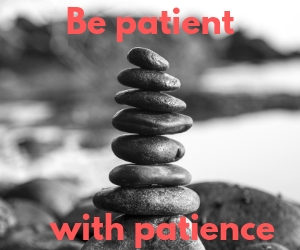
Improving this life skill includes three main processes. First, recognize signs that you are becoming impatient in your everyday life, work, and relationships. These can include things like irritability, anxiety, mental or physical tension, restlessness, and the feeling that you are running out of time to make a decision or take an action.
Next, think about what triggers your impatience. Does a particular activity affect you or is it a certain phrase or expression that someone in your life uses? Practice introspection and write these things down. Finally, be mindful of when these things happen, your physical or mental response occurs, and actively manage the symptoms.
Whenever working on a personal characteristic, sometimes it helps to “fake it till you make it.” This means that you can practice patient behaviors even if you still feel rushed and anxious about a particular delay or frustrating incident or interaction. These tricks can slowly become learned behaviors over time. Be patient with yourself during this process.
Some methods for avoiding annoyance and increasing calm include:
1 – Counting to 10 or 100. When your mind focuses on a simple repetitive task like counting, it distracts your thoughts from whatever is aggravating you. Combine it with some slow, called breathing exercises and your emotions will calm down, as well.
2 – Meditate or daydream. While an aggravating conversation may still require your attention, some things that make you feel impatient can be avoided by taking a little trip inside your mind. Picture a beautiful landscape, a relaxing situation, or a wonderful memory to get your mind off the drudgery of the moment.
3 – Speak your mind. This is not about losing your cool and yelling at someone to shut up already, or blowing your horn at a slow driver. Instead, tell other people about your frustration or growing anger before it gets out of control. For example, if your child is being particularly annoying one evening, calmly state “I’m getting very frustrated with your behavior. I need a moment to calm down” and then remove yourself from the situation.
4 – Interrupt the problem. Anything that momentarily gets your mind off of the negative situation or experience can reset the growing emotional problem inside. A quick timeout, a drink of water, stopping at a park for five minutes on your way home from a bad day at work, or even something as simple as moving your keys to another pocket can help you reset your mind.
Why is patience so important?
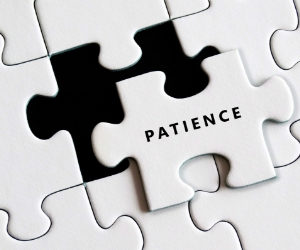
In many situations where it feels love is not present, patience is the missing piece of the puzzle. Patience is essential for both you and everyone you have a relationship with. Due to its power to change how you think, feel, and act well beyond the negative trigger, adopting a more relaxed and confident mindset stops a lot of drama before it begins. Mahatma Gandhi once said, “To lose patience is to lose the battle.” This battle is not only with other people who are attempting to change the way you think or feel but also with yourself.
In some ways, being able to calmly wait and assess the situation or simply enjoy what is going on without constantly thinking of something else is a way to have power over your life. When something occurs at school, work, out in the world, or at home that would usually cause tension and the urge to speak out or act without thought, the response you have largely comes down to how confident you are that everything will work out as it should. This is not to be confused with a Pollyanna attitude or overwhelming positivity. Instead, it is a way of recognizing the truth and waiting for what comes next before making judgment calls and responding to them.
What is the benefit of patience?

Besides simply feeling better, a host of patience-related studies have been done over the years that point to improved mental health, better interpersonal relationships, increased chance of goal achievement, and even fewer physical health problems. Most people have read articles saying stress is a killer. People who lack the ability to calmly wait when necessary have less stress than those who always feel the need to do more, say something, or solve a problem quickly.
Some of the researched powers of patience include:
• Greater overall well-being and feeling of being connected
• Fewer feelings of depression and anxiety
• Higher levels of cooperation, empathy, and understanding
• Less loneliness due to improved relationships for the long-term
• Increased willingness to make a real effort toward goals
• Decreased rates of insomnia, stomach ulcers, regular headaches, and even acne
Why do we need patience in life?

A lot of classic sayings revolve around patience. Besides it being a virtue, many people say that “Good things come to those who wait.” This attitude touches every aspect of your life no matter what you are trying to accomplish. Very few things happen immediately and give the best results. This is true whether you are facing a test at school, a project at work, or are trying to start a strong relationship with someone you are attracted to.
Patience lives right next door to perseverance. It is a way of being comfortable with the times that a process takes and the effort required to do it well. The eagerness to get something done right away, to start a task before learning the best methods, or going for the “I love you” before getting to know someone fully may backfire. Projects started and worked on with speed is the ultimate goal can leave you cutting corners or not paying close attention to vital details. Jump begin to something without knowing what you are doing can lead to failure, injury, or embarrassment. Expressing such deep emotions on a first date will leave you sitting alone at a table with a drink in your lap.
How does patience help you succeed?
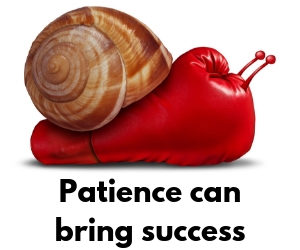
People all define success differently. The word pertains to every aspect of life and everything you try to do in it. Success is the goal of any endeavor. It is also hard won in most cases and requires considerable amounts of effort and perseverance. No matter how talented you are or how hard you work, you still need the patience to allow success to manifest in your life. Very few things are completely up to you. When other people or systems are involved, there is no use getting frustrated and annoyed at their speed or struggles.
Patience shows confidence and commitment. It allows you to carefully develop a plan to achieve any goal and the ability to follow the plan completely and methodically until you reach the desired outcome. Rushing things shows a frantic desire for the endgame without the ability to take on the responsibility necessary to reach it.
Why do you need patience in a relationship?
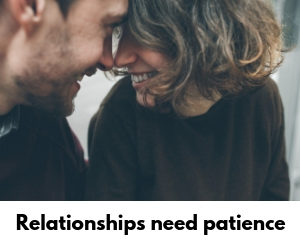
The major reason why you need patience when dealing with other people is that they do not operate the same way you do. Everyone is different and has their own schedule and set of goals that they are working toward. Of course, it is extremely difficult to not get annoyed if someone is not holding up their end of the bargain. For example, if you have to do a group project in school and one person is dragging their feet and not contributing enough, it is difficult not to get angry. However, remind yourself that the frustration will not make them take responsibility.
You need patience in professional, friendly, and romantic relationships because you want to get along while protecting your own health and well-being. You cannot impose your will or thought processes on other people, and doing so causes conflict and may even destroy a relationship that you already have. Having the ability to relax and take your time puts other people at ease. It shows that you value their time and attention. It also gives you the opportunity to think about all aspects of a relationship more fully to determine if it is a healthy one or not.
How can you be patient in a relationship?
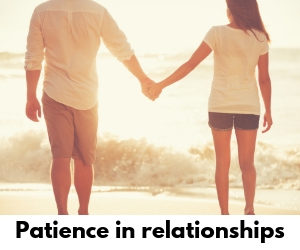
Having patience is not about being a doormat. Some people will always try to take advantage of others or cut corners to get the job done with as little effort as possible. You cannot control them. You can only monitor your own behaviors. This pertains to office culture and team projects in business, as well. Day-to-day frustration with a lazy coworker may result in anything from a headache to being labeled “not a team player” by management. Is it fair? No. However, when you practice patience and being mindful of your own responses, you can feel better about it.
Some ways of practicing patience in any type of relationship include:
• Recognize the other person as an individual and not as an extension of you.
• Open yourself up to vulnerability so the other person gets to know how you tick.
• Always listen actively and pay attention to both verbal and non-verbal communication.
• Allow for individualism. Everyone deserves time and space to be themselves.
• Avoid automatically reflecting their mood or attitude.
• Compromise. Patience allows you to feel okay with doing things a different way.
How can I be patient in love?

All of the methods to use the power of patience in relationships of any kind also work for romantic ones. When people are first attracted to each other or fall in love, it seems like they take over your heart and mind, and you want to do everything with them as soon as possible. This can lead to pressured situations that can turn someone off a relationship faster than anything.
First, practice patience when it comes to finding someone to date or become involved with. Some people turn the quest for a mate into a numbers game and put pressure on themselves to have X number of dates per month in order to increase their chances of finding “the one”, or insist on physical intimacy after a certain number of dates with any person. These types of inpatient activities have little to do with growing a worthwhile relationship.
Give yourself time, and give the other person time to get to know each other and figure out if the relationship works without being overshadowed by an anxious rushed feeling. One of the biggest problems with impatience is the lack of focus on the here and now. Your loved one wants to enjoy every moment with you, not feel like you always want to do something else or go a bit further.
Why do they say patience is a virtue?
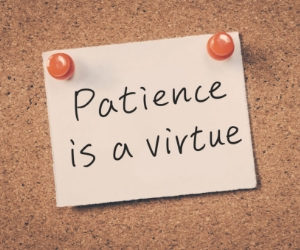
The origin of this phrase is an epic poem called “Psychomachia” written some time in the 400s CE. It personifies Patience as a godlike Virtue who bides her time until Wrath destroys herself. The general lesson is that Patience provides a type of strength that all other Virtues require to operate as intended.
This ancient story demonstrates the greatest benefit of having patience in your life. If you feel comfortable enough to sit back and wait for other thoughts or individuals to work themselves out, the end result may be better than you expect. At least, you will not get swept up in the drama and come out of these situations or thought processes with less stress.
Be Patient
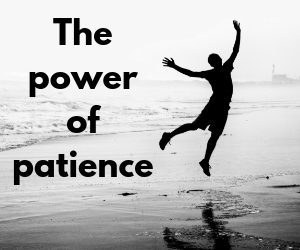
Practicing patience has far-reaching effects in your personal life and relationships. Feeling less anxious when stuck behind a slow driver is one thing that can improve your day and mood. Experiencing less anxiety and health-altering tension is something else with even greater benefits. Patience allows you to enjoy life and improve how you interact and connect with family, friends, coworkers, and loved ones. Its virtue touches every aspect of your life if you choose to cultivate it through mindfulness and conscious efforts. The power of patience is yours for the taking.

